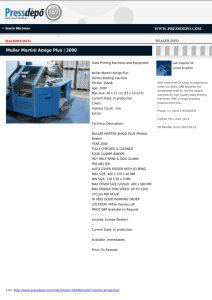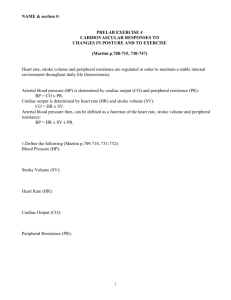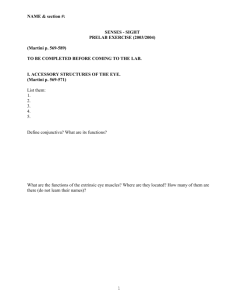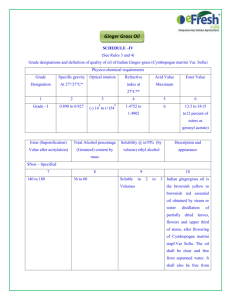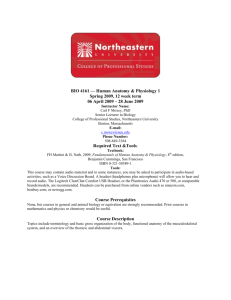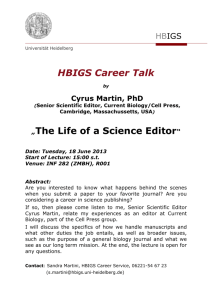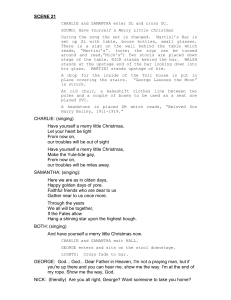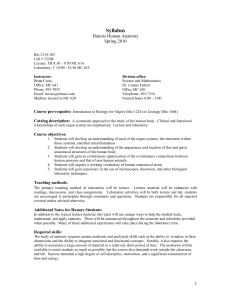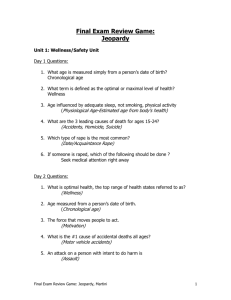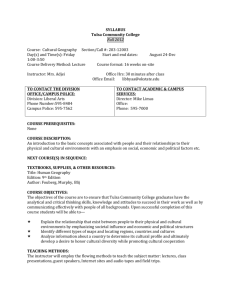BIOL_2134_101_23217_201320 - Blackboard
advertisement
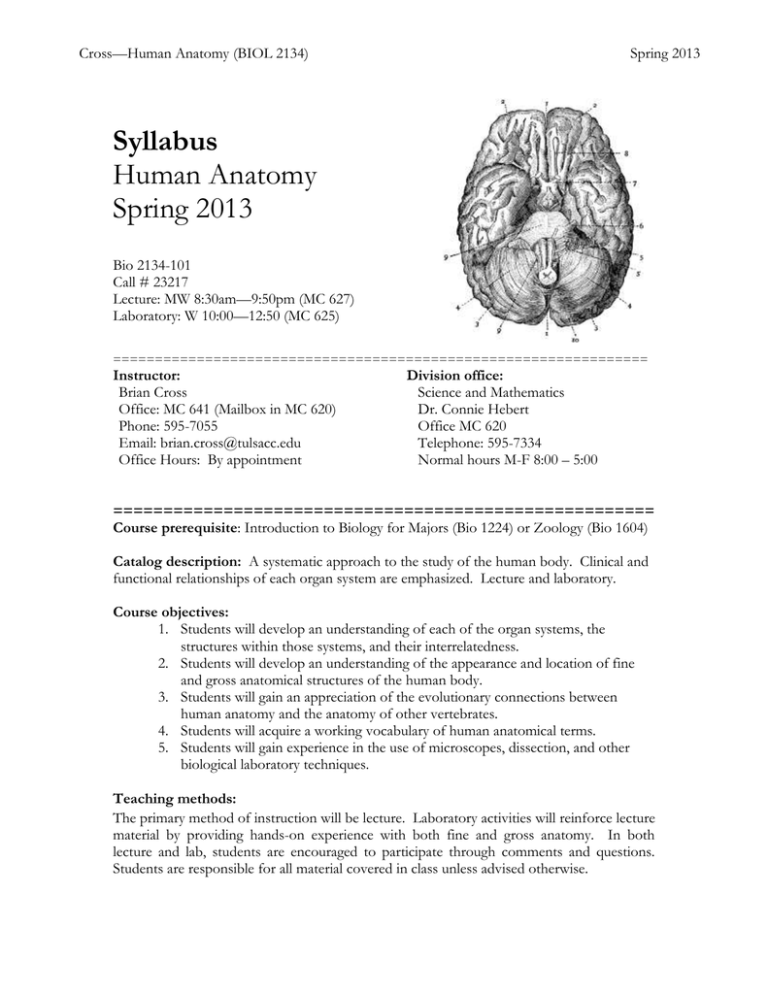
Cross—Human Anatomy (BIOL 2134) Spring 2013 Syllabus Human Anatomy Spring 2013 Bio 2134-101 Call # 23217 Lecture: MW 8:30am—9:50pm (MC 627) Laboratory: W 10:00—12:50 (MC 625) ================================================================ Instructor: Brian Cross Office: MC 641 (Mailbox in MC 620) Phone: 595-7055 Email: brian.cross@tulsacc.edu Office Hours: By appointment Division office: Science and Mathematics Dr. Connie Hebert Office MC 620 Telephone: 595-7334 Normal hours M-F 8:00 – 5:00 ====================================================== Course prerequisite: Introduction to Biology for Majors (Bio 1224) or Zoology (Bio 1604) Catalog description: A systematic approach to the study of the human body. Clinical and functional relationships of each organ system are emphasized. Lecture and laboratory. Course objectives: 1. Students will develop an understanding of each of the organ systems, the structures within those systems, and their interrelatedness. 2. Students will develop an understanding of the appearance and location of fine and gross anatomical structures of the human body. 3. Students will gain an appreciation of the evolutionary connections between human anatomy and the anatomy of other vertebrates. 4. Students will acquire a working vocabulary of human anatomical terms. 5. Students will gain experience in the use of microscopes, dissection, and other biological laboratory techniques. Teaching methods: The primary method of instruction will be lecture. Laboratory activities will reinforce lecture material by providing hands-on experience with both fine and gross anatomy. In both lecture and lab, students are encouraged to participate through comments and questions. Students are responsible for all material covered in class unless advised otherwise. Cross—Human Anatomy (BIOL 2134) Spring 2013 Required skills: The study of anatomy requires certain academic and analytical skills such as the ability to visualize in three dimensions and the ability to integrate structural and functional concepts. Notably, it also requires the ability to memorize a large amount of material in a relatively short period of time. The instructor will be available to assist students as much as possible, but the course also demands work outside the classroom and lab. Success demands a high degree of self-discipline, motivation, and a significant commitment of time and energy. Blackboard: In this course, we will be using Blackboard for general communication and for the posting of PowerPoints, study guides, links, and other miscellaneous information. In addition, all of your scores will be posted in the Blackboard gradebook. Please log on and familiarize yourself with the setup as soon as possible. To get started, go to http://bb.tulsacc.edu, and follow the directions to login. Textbook: Human Anatomy, 7th edition with PAL 3.0 laboratory disk Author: Martini et al. Publisher: Benjamin Cummings ISBN 978-0-321-68815-6 Website: www.masteringaandp.com Course Name: MAPCROSS10360 Laboratory manuals: TCC Human Anatomy (BIOL 2134) Lab Manual (INTEGRATE: The Benjamin Cummings Custom Library Program for Anatomy & Physiology) Author: Science and Mathematics, Tulsa Community College – Metro Campus Publisher: Pearson Custom Publishing ISBN: 978-1-256-22866-0 Other materials: Dissecting kit Goggles (Note that students must wear goggles during designated labs.) Gloves--disposable, medical latex Lab coat or apron (recommended) 2 Cross—Human Anatomy (BIOL 2134) Spring 2013 Evaluation Techniques: Lecture exams: 5 lecture exams worth 100 points each; lowest score will be dropped. (4X100=400) Final exam: one final exam worth 140 points (1x140=140) MAP Online Homework: 11 assignments at 5 points each; lowest score will be dropped (10x5 = 50) Supplemental Reading Assignments: three reading assignments worth 20 points each (3 x 20=60) Lab exams: 6 lab practicals worth 40 points each; lowest score will be dropped (5x40=200 points total). These exams will be based on the dissection specimens and models used in lab. Lab Dissection/Participation Points: (50 points) Total Points Possible: 900 Grades: All scores will be posted on Blackboard. Your semester grade will be based on your total points earned at the end of the semester. 90% 80% 70% 60% - 100% - 89% - 79% - 69% < 59% (~810-900): A (~720-809): B (~630-719): C (~540-629): D (0-539): F Grade Challenges In the event of a dispute about the grading of an exam or other assignment, students may submit a challenge in writing no later than one week after receiving the grade. Except in the case of simple computational error, no verbal grade challenges will be considered. Attendance and Makeup Policy: Regular attendance is strongly encouraged in both lecture and laboratory sessions. Although no credit is given for attendance per se, your presence and participation are essential to learning the material and succeeding in this course. In addition, missing class usually means missing assignments, quizzes, or exams. Makeup exams and late assignments in lecture will be allowed only in extenuating circumstances, such as family crisis or illness. Lab activities and quizzes cannot be made up under any circumstances. In the event of an absence, students are responsible for contacting the instructor to make arrangements as soon as possible. If contact is not made in a timely manner, preferably on or before the due date, the make-up exam or late assignment will not be accepted. 3 Cross—Human Anatomy (BIOL 2134) Spring 2013 Communications: Email communications: All TCC students receive a designated TCC email address in the format firstname.lastname@tulsacc.edu . This email can be accessed through www.outlook.com/tulsacc.edu. All communications to you about TCC and course assignments will be sent to this email address, and you must use this email to send email to, and receive email from, the instructor regarding this course. Inclement Weather: TCC rarely closes. If extreme weather conditions or emergency situations arise, TCC always gives cancellation notices to radio and television stations. This information is also posted on the TCC website (www.tulsacc.edu). Classroom Etiquette: Please give the instructor and your classmates the same respect that you would wish to receive from them. Such respect is essential for the free and open communication that underlies all higher learning. Texting or talking on cell phones is not permitted during class. Please turn off all phones and other cellular devices. Please arrive on time. Food and drink are not allowed in the lab. No children are allowed in lecture or in lab at any time. Students with Disabilities: It is the policy and practice of Tulsa Community College to create inclusive learning environments. Accommodations for qualifying students in compliance with the Americans with Disabilities Act (ADA) and Section 504 of the Rehabilitation Act are available. To request accommodations, contact the Education Access Center (EAC) at eac@tulsacc.edu or call (918) 595-7115 (Voice). Deaf and hard of hearing students may text (918) 809-1864. Safety and Health Issues Please advise the instructor of pertinent health issues or medications you may be taking in case an emergency arises. Academic Dishonesty: Academic dishonesty (cheating) is defined as the deception of others about one’s own work or about the work of another. Academic dishonesty or misconduct is not condoned or tolerated at campuses within the Tulsa Community College system. Tulsa Community College adopts a policy delegating certain forms of authority for disciplinary action to the faculty. In the case of academic dishonesty a faculty member may: Ask the student to redo an assignment/test or a substitute assignment/test; Record a "zero" for the assignment/test in question; Recommend to the student that the student withdraw from the class, or administratively withdraw the student from the class; Record a grade of "F" for the student at the end of the semester. 4 Cross—Human Anatomy (BIOL 2134) Spring 2013 Request that disciplinary action be taken against a student at the administrative level by submitting request to the Dean of Student Services. Institutional Statement: Each student is responsible for being aware of the information contained in the TCC Catalog, the TCC Student Policies & Resources Handbook, and semester information listed in the class schedule. All information may be viewed on the TCC website: www.tulsacc.edu General Education Goals: General Education courses at TCC ensure that our graduates gain skills, knowledge, and abilities that comprise a common foundation for their higher education and a backdrop for their work and personal lives. TCC’s General Education goals are: Critical Thinking, Effective Communication, Engaged Learning, and Technological Proficiency. Computer Services Acceptable Use Access to computing resources is a privilege granted to all TCC faculty, staff, and students. Use of TCC computing resources is limited to purposes related to the College’s mission of education, research, and community service. See TCC Student Code of Conduct Policy Handbook Syllabus Changes: Occasionally, changes to the syllabus may be necessary. Students will be notified of any changes to the syllabus in writing. 5 Cross—Human Anatomy (BIOL 2134) Spring 2013 Tentative Schedule Week of: Lecture (M&W) January 14 Syllabus; Martini 1 Martini 2 January 21 January 28 February 4 February 11 February 18 February 25 March 4 March 11 March 18 Assignments Introduction No class (MLK Day) Martini 3 Martini 4 Lab Activities (W) SR#1: Roach MAP #1, #2 Review EXAM #1 (1-4) Tissues; Integument; Lab Practical: Tissues, Skin, and Skull (40 pts.) Axial Skeleton Martini 5 Martini 8 SR#2: Jablonski Martini 9 MAP#3, #4 Martini 13 Lab Practical: Bones (40 pts.) Axial Muscles Review EXAM #2 (5,8-9, &13) Martini 14 (Martini 15**) Martini 16 MAP #5 SR#3: Shubin 5-6 Martini 17 Martini 18 Review Spring Break No Class Appendicular skeleton; Review MAP #6 SR#4: Cahill Axial Muscles (cont.) Appendicular muscles Lab Practical: Muscles (40 pts.) Endocrine system; Brain; Senses Spring Break No Class 6 Cross—Human Anatomy (BIOL 2134) Week of: March 25 April 1 April 8 April 15 April 22 April 29 May 6 Lecture (M&W) Spring 2013 Supplementals EXAM #3 (14-18) Lab Practical: Nervous and Endocrine Systems (40 pts.) Martini 19 (Martini 20**) Martini 21 Martini 22 SR #5: Weil Martini 22 (cont.); Review MAP #7, #8 EXAM #4 (19-22) Martini 23 SR #6: Nuland Martini 24 Martini 25 Martini 26 (Martini 27**) EXAM #5 (23-27) Review Lab Activities (W) MAP #9, #10, #11 Heart; Vessels Vessels (cont.) Lab practical: Circulatory System (40 pts.) Respiratory system; Digestive system Urinary and Reproductive systems Lab Practical: Misc. Systems (40 pts.) FINAL EXAM 7
